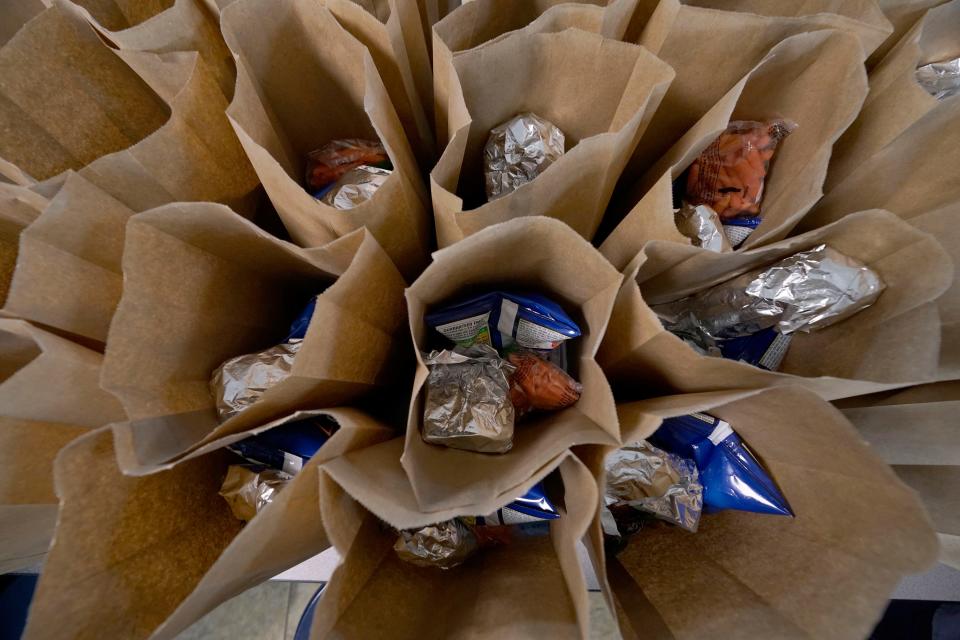'It's like we're leftovers:' Families react to MS opting out of summer food benefits program
- Oops!Something went wrong.Please try again later.
Mississippi is one of 15 states that chose to opt out of a United States Department of Agriculture food benefits program for summer 2024.
The decision to opt came at the hands of Gov. Tate Reeves. According to the Food Research and Action Center, approximately 324,000 children in Mississippi would have been eligible to receive the benefits.
The program will provide food benefits to nearly 21 million children in low-income families in states and territories that chose to opt in.
The USDA announced Wednesday, Jan. 10, that the newly permanent Summer Electronic Benefits Transfer program, or Summer EBT, will go into effect this summer after several years of testing.

The Summer EBT program intends to provide eligible families with federally-funded grocery benefits on a monthly basis when children are not in school. The program would affect grade school-aged children who are currently eligible for free or reduced-price school lunches.
The benefits come in pre-loaded cards and work in tandem with other programs such as the Supplemental Nutrition Assistance Program and summer meal sites, in which all 50 states participate. Eligible families can receive $40 per child per month.
More details: Mississippi opts out of new USDA summer food program
The decision
The deadline to notify the USDA of intention to opt in or out of the Summer EBT program was Jan. 1, 2024.
There have been several reasons given by Reeves and other state leaders as to why Mississippi chose to opt out.
Shelby Wilcher, press secretary to Reeves, said, "Mississippi declined to participate at the direction of Governor Reeves because it was originally intended to be a temporary pandemic-era program."
The Mississippi Department of Human Services oversees SNAP. Jean Cook, chief of communication for the Mississippi Department of Education, said Human Services informed MDE that it does not have the personnel to manage the Summer EBT program.
Another reason Reeves has given for opting out involves protecting Mississippi from "attempts to expand the welfare state."
Cassandra Welchlin, executive director of the Mississippi Black Women's Roundtable based in Jackson, countered this by pointing out that as one of the poorest states in the nation, Mississippi already uses a significant amount of federal dollars. She called the decision to opt out "hypocritical".
"We are a state where the government depends on those welfare dollars in other entities," Welchlin said. "So, you can't say you want the dollars in one sector of the budget, but then you don't want it to get down to your people that need it. That is very hypocritical. It's immoral, and (Reeves) needs to get those dollars back."

The reactions
Many Mississippi families are now speaking out against the decision.
Kathy Little of Runnelstown in Perry County and her husband help raise their son's four children, aged 3, 6, 13 and 15. Her son, who lives a mile down the road from Little, has a good job, but given the current economical climate still struggles to make ends meet.
Little said both she and her son think it was a horrible decision to opt out of the program. Even if you make good money, she said, the current elevated cost of groceries makes feeding multiple kids three meals a day in the summer a significant challenge.
Poll: Should MS have opted out? Poll: Should Mississippi have opted out of new USDA summer food program?
"As well as I do, by the time you buy just the basics, you're looking at close to $200 or more," Little said.
Little's son makes just enough to disqualify him from receiving food stamps. For those in this situation, even a little extra help would be significant, Little said.
For Little, one of the main issues is the lack of consideration for the public's input.
"The person that's making the decision, let's get real, most of them don't have to worry about making food from week to week," Little said. "To me, to just say, 'Nah, we don't need it. We don't want the extra trouble.' You know, it kind of makes you feel like, well, they just don't care about the everyday person, and they don't care really how bad families struggle."
Marshleane Gillion of Laurel takes care of her great-grand children, a 9-year-old girl and a boy who is a senior in high school and lives with her. For her family, the Summer EBT would have helped significantly.
"We really need that extra help because the few months that they're out, they can eat you out of house and home for breakfast, dinner and snacks in between," Gillion said.
A lot of people in her community, Gillion said, feel the same way about the decision, but are not very vocal about it.
"There's a lot of grandparents and great grandparents that don't come forward because they're afraid that if they come forward, they're going to lose their income," Gillion said. "So they don't come forward. They take whatever is left. It's like we're leftovers."
Gillion also emphasized that this decision affects a vast community across Mississippi.
"It's terrible that we can't get help," Gillion said. "And it's not just poor Black people, it's poor people period."
Welchlin said if Mississippi had chosen to opt-in, the Summer EBT would have given low-income families the autonomy and dignity to "chose the time they can feed their children and how they feed their children."
Welchlin pointed to the disproportionately high poverty rates in Mississippi, especially for Black women and children. Many families, especially given inflation rates and lingering economic issues from the COVID-19 pandemic, cannot make ends meet even while working full-time.
"That's the thing," Welchlin said. "They're working, but they're not making enough money to provide adequate food, take care of mortgages and take care of utilities."
Other options
Wilcher, press secretary to Reeves, also noted that other resources are available for Mississippi children, namely the Summer Food Service Program.
The SFSP provides lunches to kids during the summer months at meal sites across the state and is supported by schools and nonprofits. Another summer food program is called the Seamless Summer Option and involves schools continuing to provide lunches when school is out, primarily June and July.
Both the SFSP and the Seamless Summer Option rely on parents and guardians driving to designated locations to pick up meals.
For many, like Gillion and Little, these programs are not feasible due to the location of the sites and the fact that reliable transportation is needed to get to the sites.
"You got to have gas money for your transportation, so it doesn't affect me that much," Gillion said. "At one time, we had a group that would bring the meals around and drop them for children that didn't have transportation."
Little shared similar sentiments.
"We live out in a rural area," Little said. "In cities where they have the summer feeding program, most kids are pretty close — a lot of them are within walking distance of one. Well, here you are not."
Welchlin also pointed out that many working parents don't have the flexibility to leave work and drive to pick up these lunches at the meal sites.
"They don't have that kind of flexibility," Welchlin said. "If they were able to have their own resources, they control when they buy those groceries and when they can feed their children in a time that is convenient for them and not controlled by outside entities. ... That's self determination. That's dignity."
More on Reeves: Gov. Tate Reeves pledges to focus on economy, healthcare sector, as he is sworn in Tuesday
The Director of Child Nutrition for MDE, Scott Clements, said these issues may be mitigated as more sites open. He said the number of sites across Mississippi were reduced due to COVID-19. Now, the number is growing again.
In the summer of 2022, there were 307 meal sites in Mississippi. In the summer of 2023, that number increased to 403. In summer 2023, the sites provided 1.2 million meals.
Clements said he is encouraged by the growing number of sites and interest in sponsoring sites.
"Four hundred three across the state is a pretty good clip," Clements said. "There will be more sites in more areas, and we hope that will mitigate the problems with transportation."
Clements also noted there are alternatives for families that don't have reliable transportation; some chapters of the Boys and Girls club offer bus rides to the sites.
The MDE provides a meal site finder on it's website which will provide locations starting in May.
Next steps
In total, 35 states, four tribes and all five U.S. territories opted in for summer 2024.
Other states that opted out include Alabama, Alaska, Florida, Georgia, Idaho, Iowa, Louisiana, Nebraska, Oklahoma, South Carolina, South Dakota, Texas, Vermont and Wyoming.
Mississippi and the other states that opted out will have another chance to opt in for the summer of 2025.
Little said she hopes state leaders such as Reeves will consider the upcoming decision more carefully.
"Before they make the decision for 2025, they need to get out in these communities and talk to parents and see what struggles parents are having," Little said.
Gillion also hopes for a different outcome in 2025.
"I really truly hope they change their mind, because it's not their decision," Gillion said. "This should be a decision of the voters or the parents. I don't think it should be up to the state capital to decide what we need."
Have a news tip? Contact Mary Boyte at mboyte@gannett.com.
This article originally appeared on Mississippi Clarion Ledger: MS opts out of Summer EBT food program, local families speak out
